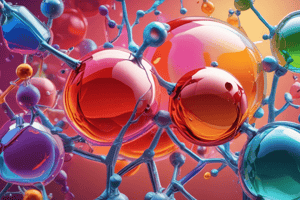Podcast
Questions and Answers
What are the different synthesis routes for phenols?
What are the different synthesis routes for phenols?
Electrophilic aromatic substitution, nucleophilic aromatic substitution, or oxidation of aromatic compounds.
Name one application of phenols.
Name one application of phenols.
Antioxidants
How can ethers be classified based on the nature of R groups?
How can ethers be classified based on the nature of R groups?
Alkyl, aryl, or alkenyl ethers
What is a classic example of an ether commonly used for extracting alkaloids from plant material?
What is a classic example of an ether commonly used for extracting alkaloids from plant material?
What are the main applications of ethers?
What are the main applications of ethers?
How are alcohols classified based on the carbon atom to which the hydroxyl group is attached?
How are alcohols classified based on the carbon atom to which the hydroxyl group is attached?
What is the defining characteristic of alcohols?
What is the defining characteristic of alcohols?
What are some common routes for synthesizing alcohols?
What are some common routes for synthesizing alcohols?
What is the defining characteristic of phenols?
What is the defining characteristic of phenols?
How are phenols classified based on the number of substitutions on the aromatic ring?
How are phenols classified based on the number of substitutions on the aromatic ring?
Flashcards are hidden until you start studying
Study Notes
Organic Chemistry: Exploring Alcohols, Phenols, and Ethers
Organic chemistry, the study of carbon-based molecules, is a vast and interconnected discipline. Three fundamental classes of compounds that you'll often encounter are alcohols, phenols, and ethers. Let's delve into their properties, synthesis, and applications.
Alcohols
Definition: Alcohols are organic compounds containing a hydroxyl group (OH) bonded to a carbon atom.
Types: Alcohols can be classified as primary (1°), secondary (2°), or tertiary (3°). A primary alcohol has the hydroxyl group attached to a carbon that is bonded to one alkyl group, secondary alcohols are attached to two alkyl groups, and tertiary alcohols are attached to three alkyl groups.
Synthesis: Alcohols can be synthesized through various routes such as reduction of carbonyl compounds, nucleophilic acyl substitution, or oxidation of alkanes.
Applications: Alcohols are ubiquitous in chemistry and serve as building blocks for numerous products. For example, they are key components in the production of pharmaceuticals, solvents, polymers, and cosmetics.
Phenols
Definition: Phenols are aromatic compounds containing a hydroxyl group (OH) bonded to a carbon atom that is part of an aromatic ring.
Types: Phenols can be mono-, di-, or poly-substituted.
Synthesis: Phenols are synthesized through various routes such as electrophilic aromatic substitution, nucleophilic aromatic substitution, or oxidation of aromatic compounds.
Applications: Phenols are found in numerous applications, such as antioxidants, pharmaceuticals, and fragrances. They also serve as precursors for the synthesis of various polymers and dyes.
Ethers
Definition: Ethers are organic compounds containing a carbon-oxygen bond (R-O-R').
Types: Ethers can be classified as alkyl, aryl, or alkenyl ethers depending on the nature of the R groups.
Synthesis: Ethers can be synthesized through various routes such as nucleophilic substitution, electrophilic substitution, or dehydration of alcohols.
Applications: Ethers are widely used as solvents, plasticizers, and intermediates in the synthesis of various organic compounds and polymers. Diethyl ether (ethyl ether) is a classic example, renowned for its use in extracting alkaloids from plant material.
Organic chemistry is rich in subtopics, and understanding alcohols, phenols, and ethers will give you a solid foundation for exploring more complex compounds and reactions in this fascinating field.
Studying That Suits You
Use AI to generate personalized quizzes and flashcards to suit your learning preferences.



